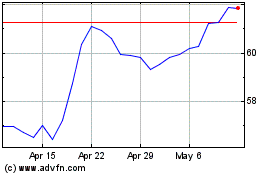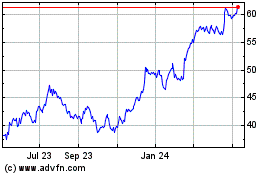By AnnaMaria Andriotis, Telis Demos, and Emily Glazer
Banks and credit-card companies are discussing ways to identify
purchases of guns in their payment systems, a move that could be a
prelude to restricting such transactions, according to people
familiar with the talks.
The discussions are preliminary but could be deeply
controversial. Gun-rights groups have long resisted any effort to
monitor which Americans own guns; there are federal laws limiting
the government's use of electronic databases of gun sales.
The financial companies have explored creating a new credit-card
code for firearms dealers, similar to how they code restaurants or
department stores, according to people familiar with the matter.
Another idea would require merchants to share information about
specific firearm products consumers are buying, some of the people
said.
Such data could allow banks to restrict purchases at certain
businesses or monitor them. The talks, which are informal and might
not lead to any action, have occurred against the backdrop of the
national debate around guns in the wake of the Parkland, Fla.,
high-school shooting, which left 17 dead.
Financial firms already have come under pressure from both sides
in the gun debate.
Senate Banking Committee Chairman Mike Crapo (R., Idaho) last
week sent letters to Citigroup Inc. and Bank of America Corp.
criticizing moves by the banks to enforce new policies on
gun-industry clients or to stop doing business with certain gun
makers.
The prior week, the American Federation of Teachers announced it
would cut ties with Wells Fargo & Co. over what it said was the
bank's failure to discuss with the union its relationship with the
National Rifle Association and gun manufacturers.
Even a move to monitor gun purchases would be contentious,
highlighting concerns about the use of consumer data and Wall
Street's involvement in a sensitive political area.
"There's a privacy angle here," said Adam Levitin, professor of
law at Georgetown University. "There's the slippery slope danger if
it's guns today maybe it is pornography tomorrow and the day after
it's right-wing literature."
Gun-control advocates counter that banks keep tabs on all sorts
of transactions to manage risk and to prevent illegal activity.
"Knowing where the customers are shopping isn't a slippery slope
to anything, it's just one data point," said Nicholas Suplina,
director of criminal-justice policy and enforcement at Everytown
for Gun Safety, an advocacy group whose advisory board includes
Warren Buffett and former New York City Mayor Michael Bloomberg, a
Republican-turned-Independent. "I don't think anybody's asking
financial institutions to determine whether a transaction is good
or bad, but it may very well be a good idea for them to understand
risks inherent in firearm sales."
Banks at times have blocked consumer-card purchases considered
risky or prone to fraud or in a legal gray area. They also act as
agents of the government in monitoring payments for suspicious
activity such as transactions that could finance terrorism.
In rare cases, banks have stopped doing business with
politically unpalatable groups, such as with the South African
government during the 1980s antiapartheid movement. But banks
typically haven't tried to block or restrict controversial
purchases made by consumers.
How companies use data generated by people's activities has
become a flashpoint in the wake of the controversy about the
harvesting of consumers' personal information and activities at
Facebook Inc. by outside companies.
"A bank could say, 'We're not going to do business with gun
manufacturers,' " said Jeremy Stein, a former member of the Federal
Reserve Board of governors who currently is an economics professor
at Harvard University. "But when it gets into using the
information, you're getting into the same issues Facebook and
others had problems with."
A dividing line, he added, would be whether banks are monitoring
transactions for criminality. "If it's just a policy objective,
even if I liked the policy objective, I'd think it's worrisome,"
Mr. Stein added.
Divisions exist within the financial-services industry, which
previously has resisted pressure to restrict purchases of
controversial products such as tobacco. "We don't think it's a good
idea for banks to decide what products and services Americans can
buy," Wells Fargo CEO Timothy Sloan said at the bank's annual
meeting last week. "It should not be up to me, to us, to decide
that. It should be up to folks following the laws and folks making
decisions."
Citigroup, following the Feb. 14 Parkland shooting, adopted a
new code of conduct for gun dealers and manufacturers the bank does
business with. The code includes firearms retailers restricting
sales for buyers under age 21.
CEO Michael Corbat said at that bank's annual meeting that the
policy "is intended to preserve the rights of responsible gun
owners like myself, while relying on best sales practices to keep
firearms out of the wrong hands."
The policy "does not impact the ability of Citi customers to use
their credit and debit cards for the legal purchase of firearms,"
according to a bank spokesman. He added that the bank "is focused
on implementing its firearms policy and not on conversations around
identifying gun purchases."
A spokesman for Bank of America said the bank's policy is to
stop making new loans to manufacturers of certain kinds of assault
rifles sold to civilians. He said the bank isn't involved in
discussions about credit cards.
Separately, discussions among some banks and card networks
around possible gun-related actions related to cards so far have
centered on so-called merchant-category codes, or MCCs. These
identify the type of merchant where consumers are shopping. A small
number describe the type of product, including a code for office
furniture and digital games. One possibility is the creation of a
new code that categorizes gun dealers. That would be shared with
card companies, banks, and payment processors when cardholders make
purchases at those merchants.
Card networks such as Visa Inc. or Mastercard Inc. can create
MCCs or can request approval for one from a Switzerland-based
standards group so that it is applied throughout the payments
industry.
Currently, card companies, including networks and banks that
issue credit cards, have little to no insight into gun purchases.
Gun sellers fall into broader categories such as sporting-goods
retailers or specialty retail shops.. Big-box retailers that also
sell guns are often assigned codes that include "variety" or
"discount" stores.
An area of discussion, according to the people familiar with the
talks: How far reaching a new MCC would be. This code could
identify purchases made at gun dealers -- but not at merchants that
primarily sell other products, such as Walmart Inc.
Some talks have gone further. At least one large U.S. bank has
had early conversations with lawmakers about potential legislation
to require merchants to share information about specific
gun-related products consumers are buying with their cards,
according to people familiar with the matter.
Write to AnnaMaria Andriotis at annamaria.andriotis@wsj.com,
Telis Demos at telis.demos@wsj.com and Emily Glazer at
emily.glazer@wsj.com
(END) Dow Jones Newswires
April 30, 2018 21:02 ET (01:02 GMT)
Copyright (c) 2018 Dow Jones & Company, Inc.
Wells Fargo (NYSE:WFC)
Historical Stock Chart
From Mar 2024 to Apr 2024

Wells Fargo (NYSE:WFC)
Historical Stock Chart
From Apr 2023 to Apr 2024
